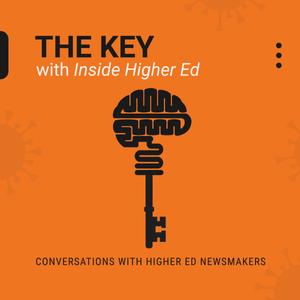
The Key with Inside Higher Ed
insidehighered
Conversations with Higher Ed Newsmakers
- 55 minutes 59 secondsEp. 139: Enrollment Management's AI FutureHighly customized admissions information and processes. Credit transfer evaluations that take minutes, not days or weeks. Precision tuition discounting estimates. Student success interventions informed by data gathered about students before they ever even applied to their institution. These are some of the ways that artificial intelligence is or may soon be improving the enrollment management experience for students, teams and institutions. That’s according to our recent panel discussion with experts Joseph Paris, dean of graduate and professional studies at Delaware Valley University, Naronda C. Wright, president of NAGAP at The Association for Graduate Enrollment Management and associate dean of the Jack N. Averitt College of Graduate Studies at Georgia Southern University, and Claire Brady, president of Glass Half Full Consulting. The discussion, featured on this episode of The Key, Inside Higher Ed's news and analysis podcast, also draws on insights from “Beyond the Hype: Understanding and Unlocking AI’s Potential in Enrollment Management,” a recent special report Inside Higher Ed published on the following:
- How admissions and enrollment management teams are already deploying AI to assist their work
- The potential near- and longer-term future of AI in enrollment management
- Best and emerging practices for building data readiness and AI literacy among admissions and enrollment management personnel
Hosted by Colleen Flaherty, senior editor of special content at Inside Higher Ed. This episode is sponsored by Liaison.23 December 2024, 8:00 am - 54 minutes 10 secondsEp. 138: Doug Lederman Says Farewell to Inside Higher Ed
In his final days in the newsroom, editor and co-founder of Inside Higher Ed and host of The Key, Doug Lederman, sits down with editor-in-chief Sara Custer to discuss his nearly 40-year career in higher education and what he plans to do next.
Doug talks about his work as a journalist over four decades, including leading Inside Higher Ed for the past 20 years. Doug shares what kept him up at night when he and Scott Jaschik started a new, independent media company in 2003 and the big breaks along the way that helped establish Inside Higher Ed as a trusted source of news for universities and colleges across the country.
Doug and Sara discuss the future of IHE and how its role to both explain higher education to readers and hold it to account is more critical now than it has ever been.
"I don’t think us journalists would be writing about higher education if we didn’t think it was important,” he says.
Hosted by Sara Custer, editor in chief of Inside Higher Ed. This episode is sponsored by the Gates Foundation.
Follow us on Apple Podcasts Google Podcasts Spotify
18 December 2024, 9:47 pm - 38 minutes 30 secondsEp. 137: How to Lead With Purpose in Higher Ed
College presidents don’t work in a bubble and there are a multitude of competing priorities jostling for their time and attention on a daily basis. It can be an overwhelming job, but having a guiding purpose behind every decision a president makes, the teams they form and the long-term strategies they develop can help keep leaders on the right track. How do they know which areas deserve their attention and which should be delegated to talented team members? How do they know they are making the right decisions and doing good by their institution? When should they take risks?
In this episode of The Key, Inside Higher Ed’s news and analysis podcast, Donde Plowman, the chancellor at UT Knoxville, Harry Williams the former president of Delaware State University and the current president and CEO of the Thurgood Marshall Foundation, and Jonathan Koppell, president of Montclair State University tell an audience at the Student Success US event how they keep their purpose front of mind as they lead their institutions.
They share their experiences of making tough decisions, championing student success to stakeholders, lobbying for greater funding from legislators and striking out on paths unknown with new partners.
Hosted by Sara Custer, editor in chief of Inside Higher Ed. This episode is sponsored by the Gates Foundation.
Follow us on Apple Podcasts Google Podcasts Spotify
13 December 2024, 5:23 pm - 31 minutes 7 secondsEp. 136: Voices of Student Success: GenAI in Teaching and Learning
Over the past two years, generative AI has blazed its way on to college campuses, first in the students’ hands and increasingly in the hands of administrators and instructors to improve campus operations and enrollment management, as well as teaching and learning.
One of the greatest challenges of using generative AI in teaching is providing students with skills without interrupting the process of learning or introducing errors or misinformation. The University of Texas at Austin is in the initial stages of launching a custom GPT model, UT Sage, which serves as a tutor of sorts for students who need help related to a specific course.
In this episode of Voices of Student Success, Julie Schell, assistant vice provost of academic technology at UT Austin, shares the inspiration behind the tool, her work with AI in the classroom and teaching the ethics of AI use.
Hosted by Inside Higher Ed Student Success Reporter Ashley Mowreader. This episode is sponsored by KI. Read a transcript of the podcast here.
Follow us on Apple Podcasts Google Podcasts Stitcher Spotify
11 December 2024, 7:29 am - 46 minutes 12 secondsEp. 135: Reasons to Be Optimistic About Student Success Efforts
A recent IHE survey of university and college student success administrators found that they are confident in the quality of education their institution provides and say their college is effective in making student success an institutional priority. There are, however, still many areas where administrators say their institution can improve, with greater effort among faculty being the most common desired action.
This episode of The Key explores the results of our survey and how they compare with what students have told us in other polls. We’ll also hear a case study on how a teaching and learning center is encouraging faculty to be active participants in students’ success. Joining the discussion are Colleen Flaherty, special content editor at Inside Higher Ed, and Trey Conatser, assistant provost for teaching and learning at the University of Kentucky and director of UK’s Center for the Enhancement of Teaching and Learning.
Both discussions paint an overall optimistic picture of how institutions are working to find innovative ways to support their students to stay in college and graduate.
You can read more about our survey findings in our article “Survey: Student Success Administrators Optimistic”.
Hosted by Sara Custer, editor in chief of Inside Higher Ed. This episode is sponsored by the Gates Foundation.
Follow us on Apple Podcasts Google Podcasts Spotify
5 December 2024, 2:28 pm - 31 minutes 49 secondsEp. 134: Voices of Student Success: Life Design for Student Success
A growing number of colleges and universities are integrating life design into the student experience to improve student well-being, academic pursuits and future planning beyond graduation. Life design, which originates from the 2016 book Designing Your Life, uses design thinking principles to help guide individuals as they navigate change and transition, ultimately helping them find meaning and purpose in their lives.
In this episode of Voices of Student Success, Adrienne Ausdenmoore, assistant vice president and executive director, Geoffrey H. Radbill Center for College and Life Design at Bowling Green State University, shares how the university is implementing campus-wide changes to integrate life design into the student experience. Later, hear from Stanford University’s James Tarbox, assistant vice provost and executive director of career education, who shares how life design is essential in career services.
Hosted by Inside Higher Ed Student Success Reporter Ashley Mowreader. This episode is sponsored by KI. Read a transcript of the podcast here.
Follow us on Apple Podcasts Google Podcasts Stitcher Spotify
25 November 2024, 7:52 am - 37 minutes 43 secondsEp. 133: Voices of Student Success: The Evolution of the Campus Library
Many college libraries have undergone transformation in recent years to serve as hubs for student success, offering a central location for students to hang out, work with peers and connect to support resources like tutoring. This reimagination of the library often comes with a physical reconfiguration, relocation of offices and expanded services, all in hopes of supporting access and student success.
In this episode of Voices of Student Success, Katie Clark, higher education market manager for KI and a former campus administrator, speaks to the evolution of the campus library and what it means for students and practitioners. Later, hear from Marquette University’s Lemonis Center director Marilyn Jones and vice provost for academic affairs and student success, John Su, to discuss how Marquette remodeled its Memorial Library to better support students.
Hosted by Inside Higher Ed Student Success Reporter Ashley Mowreader. This episode is sponsored by KI. Read a transcript of the podcast here.
13 November 2024, 7:40 am - 20 minutes 30 secondsEp. 132: Voices of Student Success: Teaching Career Competencies In On-Campus Work
Internships are a high-impact practice that can provide students with valuable career skills, a professional network and on-the-job experience, but not every student has the opportunity to participate. A recent report found of the 8.2 million students who wanted to intern in 2023, close to half didn’t participate in one. Many of these students are from historically marginalized groups, including first-generation, low-income, community college students and students of color.
The University of New Hampshire launched Campus-2-Career in 2022, a campus-wide program that equips students with career competencies through their on-campus work positions.
In this episode, Gretchen Heaton, associate vice provost for career and professional success and high impact practices at the University of New Hampshire, discusses how UNH is increasing rich work-based learning opportunities through intentional professional development.
Hosted by Inside Higher Ed Student Success Reporter Ashley Mowreader. This episode is sponsored by KI. Read a transcript of the podcast here.
Follow us on Apple Podcasts Google Podcasts Stitcher Spotify
30 October 2024, 7:00 am - 33 minutes 23 secondsEp. 131: Bipartisan Alignment Around Workforce Training
The partisan divide in the U.S. seems unbridgeable at times, and many issues in higher education are deeply dividing politicians. But with the 2024 election just days away, there’s a remarkable amount of alignment around the importance of workforce development and training and how to strengthen it.
A new episode of The Key explores explores the relative consensus between the parties and its implications. Joining the discussion are Amanda Winters, program director for postsecondary education at the National Governors Association, and Michelle Van Noy, director of the Education and Employment Research Center at Rutgers University’s School of Management and Labor Relations.
They examines how this alignment around workforce training is affecting policy development at the state and federal levels, and how November’s election might change what happens in the next few years, if at all. Hosted by Doug Lederman, editor and co-founder of Inside Higher Ed. This episode is sponsored by The Gates Foundation.
Follow us on Apple Podcasts Google Podcasts Stitcher Spotify
23 October 2024, 7:00 am - 22 minutes 33 secondsEp. 130 Bonus Episode: Focus on Caring and Building Strengths Leads Students to Success
In this episode of The Key, Melissa Ezarik speaks with University of Tennessee, Knoxville’s chancellor, Donde Plowman, and Amber Williams, vice president of student success on their efforts to ensure their teams—and students—are aware of and confident about their strengths as they navigate their work.
Williams, who joined the institution in 2020, soon before it fell a bit short on its retention increase goal, has found it helpful to remind colleagues that data is about individuals and showing what can be done to meet their needs. “One of my framings for leadership is that you lead through people, priorities and then projects,” she says. “People is the first thing. If you don’t get the people part right, the rest of it doesn’t work.”
On October 28, 29 and 30, student success professionals from across the country will visit UT’s campus to share their challenges and successes in supporting students at their own institution. Learn more about the Student Success US event here, and look out for coverage in Inside Higher Ed.
Hosted by Inside Higher Ed Student Success Editor, Melissa Ezarik. Read a transcript of the podcast here.
Follow us on Apple Podcasts Google Podcasts Stitcher Spotify21 October 2024, 7:00 am - 24 minutes 40 secondsEp. 129: Voices of Student Success: A College Bridge Program for Incarcerated Students
In July 2023, Congress lifted a ban on federal Pell Grant funding for incarcerated individuals in prison education programs, but there still remain barriers to enrollment and success for these learners. The Petey Greene Program (PGP), a non-profit organization that partners with prisons and higher education institutions, launched a College Bridge program in 2020 to increase college-level writing, reading and math skills for incarcerated students.
In this episode, PGP’s Chiara Benetollo, executive director of The Puttkammer Center for Educational Justice and Equity, and Katherine Meloney, director of the Villanova Program at SCI Phoenix, discuss the college bridge program and the ways higher ed can support justice and learning for incarcerated individuals.
Hosted by Inside Higher Ed Student Success Reporter Ashley Mowreader.
This episode is sponsored by KI. Read a transcript of the podcast here.
Follow us on Apple Podcasts Google Podcasts Stitcher Spotify16 October 2024, 7:00 am - More Episodes? Get the App
Your feedback is valuable to us. Should you encounter any bugs, glitches, lack of functionality or other problems, please email us on [email protected] or join Moon.FM Telegram Group where you can talk directly to the dev team who are happy to answer any queries.
 Code Switch
Code Switch
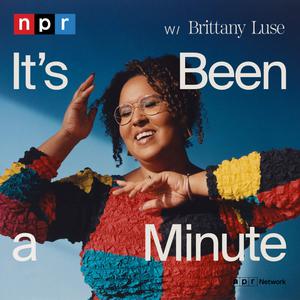 It's Been a Minute
It's Been a Minute
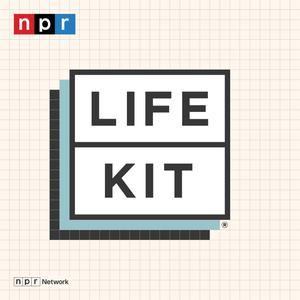 Life Kit
Life Kit
 America Dissected
America Dissected
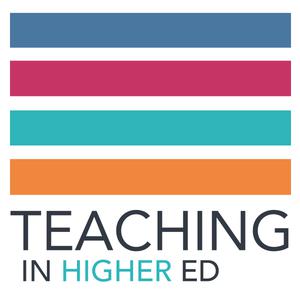 Teaching in Higher Ed
Teaching in Higher Ed
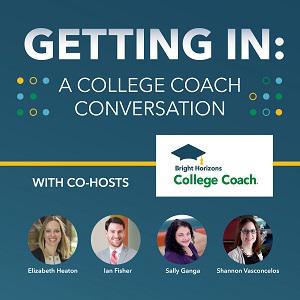 Getting In: A College Coach Conversation
Getting In: A College Coach Conversation